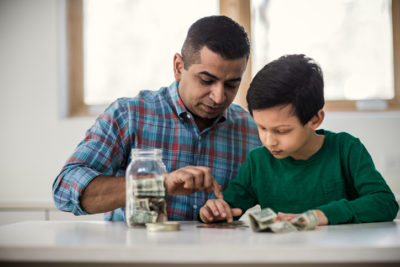Many new parents dream about the things they’ll teach their children: how to count to 10, read a first book, sing along to a favorite song or ride a bike. But with credit card debt averaging well over $8,000 per household in the U.S., it’s just as important—though a little less dreamy—to teach children the basics of money.
“Developing good money habits in your children is essential to laying a strong foundation for managing their finances as they reach adulthood,” says Katie Ross, education and development manager for the non-profit organization American Consumer Credit Counseling.
It’s critical to start early: a study from Dr. David Whitebread and Dr. Sue Bingham at the University of Cambridge found that the “habits of mind” children use to solve problems, including financial ones, are developed by age seven.
Here are Ross’s dos and don’ts for developing those positive habits:
 DO:
DO:
Get Kids A Savings Account
Set up a bank account for kids’ savings and help them set concrete goals, like buying a toy or video game. Bring them to the bank to make regular deposits from their allowance, and if they receive money as a gift, like a birthday check from a grandparent, encourage them to spend only part of the amount and put the rest in savings.
Teach Kids To Distinguish Between Needs & Wants
At the store, ask school-age kids to point out which items in the cart are essential and which are optional. Older kids can make lists of needs and wants and rank them according to priority.
Make Kids Earn Their Allowance
Encourage kids to work for their money, whether that means taking on extra responsibilities around the house or doing work outside the home, like mowing lawns, babysitting or tutoring. This teaches them that money has to be earned.
Let Kids Practice Credit Management
Let older kids borrow money from you under “credit card” terms. If they need funds for a splurge, set a credit limit, repayment schedule and standard interest rates, lend them money for the purchase, then have them pay you back under those terms. (You can use the terms of your own credit card as a starting point.) They’ll get comfortable with the concept of credit without affecting anyone’s actual credit score.
DON’T:
Let Kids Set Unrealistic Savings Goals
“Make sure they have both short- and long-term goals,” suggests Ross. If they’re having trouble reaching them, offer more jobs around the house they can do to earn more money.
Let Kids Slide
Don’t hesitate to charge interest or a late fee if older kids fail to make a payment on their family “credit card.” It’s important for them to learn that credit is not free money.
Use Credit Cards For Every Purchase
“It’s easier to demonstrate the value of money if cash is present in your transactions,” explains Ross. Try setting aside cash in an envelope for regular purchases like school supplies or restaurant meals and let kids see you spend it, so they understand that money is a finite resource—once the cash is spent, you don’t get it back.
Be Afraid To Talk To Kids
It’s important your kids hear about your own financial situation and past choices, good or bad. “It’s okay for kids to be aware of your household priorities, and what you can and cannot afford,” says Ross.
Speaking of saving, you could save hundreds on car insurance, home insurance and more at geico.com. Get a fast, free quote now and see how much you could save!
Continue reading: Should kids get an allowance?











Danielle Gauthier says,
100% correct! Spot on Geico thank you so much for reestablishing priorities in parenting and also being able to relate that on a level website that many people can relate to. How mindful and useful these resources are in time of need.
Danielle Gauthier says,
Amazing!!!!!!